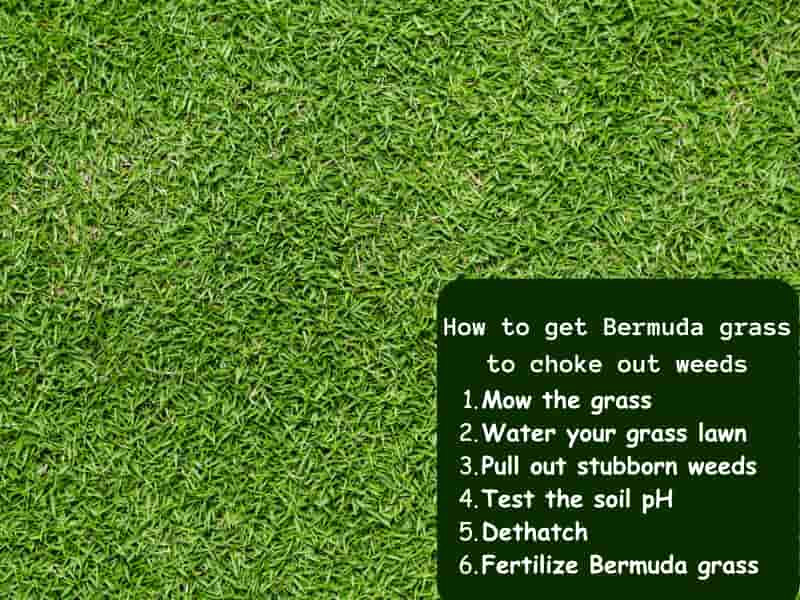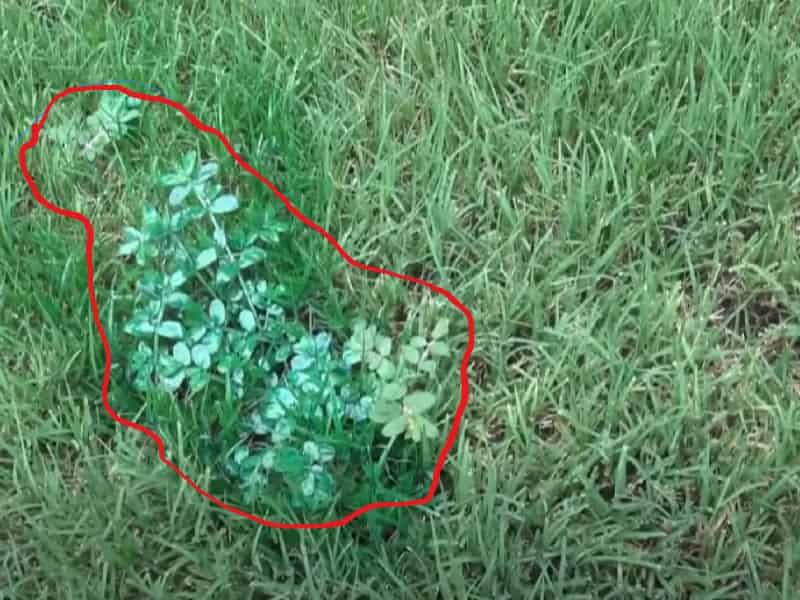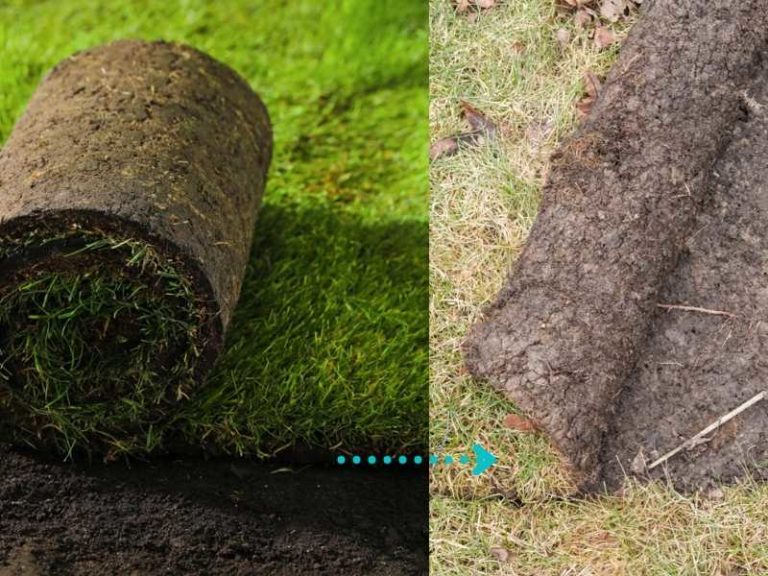Does Bermuda Grass Choke Out Weeds?
Did you know that you can nurture a lawn that limits weeds by itself? And all it takes is the right grass. A skilled homeowner or lawn care professional knows how to grow Bermuda grass to full thickness. It might even save you a substantial amount in herbicides and weed killers.
Bermuda grass, considered a weed by some lawn experts, is a perfect lawn choice for choking out weeds. Thick Bermuda grass chokes weeds by overpowering the weed species and disrupting their life cycles. Its aggressive growth habit makes it a superior choice for a natural weed suppressant.
Contents
Will Bermuda grass choke out weeds?
Weed control using Bermuda grass varies by region. Bermuda grass or wiregrass is an excellent weed choker for warm areas with weed-resistant lawns. It grows and spreads its above-the-ground stems, called stolons, and below-the-ground stems, called rhizomes, depriving weeds of water, sunlight, and micronutrients.

Considered a weed, Bermuda grass can choke out most weed species that compete with grass. It is native to tropical and subtropical countries in the world. It’s a perennial warm-season grass, allowing it to grow back every year. It’s most active during late spring and hot summer months.
Bermuda’s weed-choking abilities increase when:
- It grows in a warm climate.
- It can access full sun and proper drainage.
- It grows in salty sands and humid regions.
- It gets one inch of watering twice a week.
- It’s regularly dethatched.
- It’s fertilized monthly during its growing season.
- It’s mowed to a 2.5 height.
How to get Bermuda grass to choke out weeds
For Bermuda to choke out weeds, the following growing conditions should apply:

Mow the Bermuda grass
Mowing your Bermuda grass 2.5 inches high allows it to quickly spread its stolons and rhizomes to shade the weeds. The shading prevents the weeds from photosynthesizing. They end up malnourished and eventually die from starvation, allowing the Bermuda grass to prevail over them. Mow your lawn using a catcher to prevent the mowed weeds from occupying your grass.
Water your Bermuda grass lawn
Bermuda grass may be heat and drought-tolerant, but it still needs water. Moreover, daily watering causes Bermuda grass to have shallow and weak roots, speeding up the weed germination rate.
Keeping Bermuda grass lush and healthy starts with applying at least one inch of water every week. Deep watering ensures the roots get the water first. Plan the watering early in the morning, between 6 am and 8 am, when there’s minimal water evaporation.
One-inch deep watering twice a week should work in an arid or hot climate region. Bermuda grass lawns may benefit from infrequent watering in cooler northern and rainy climates.
Pull out stubborn weeds by hand after watering.
Watering your Bermuda grass lawn softens the soil and makes it moist. Pulling out the weeds by hand after watering makes your work easier. Pull out the weeds by the roots and dispose of them in a compost bin.
Test the soil pH
Most weed species infesting lawns, such as horsetail, dandelions, and plantains, prefer acidic soil. On the other hand, Bermuda grass may not grow healthy in acidic soils since it does well in soil with a pH of 5.8 to 7.0. The first step to stimulating Bermuda grass’s choking ability is to test the soil pH using a pH tester. If it indicates a pH below 5.8, raise it using diluted calcitic lime or weak lime.
Lime is a toxic-free agent that raises the soil pH and reduces soil acidity. It strengthens the Bermuda grass and weakens weeds, making it easier to choke the latter out.
Dethatch your Bermuda grass lawn.
Excess thatch buildup from Bermuda roots, rhizomes, and stems can choke it out. When left unchecked, thatch builds up on your lawn. Thatch may lead to yellowing in Bermuda grass and reduced resistance to drought hardiness.
To ensure your Bermuda grows lush and green all year round, dethatch around spring when it is actively growing.
Follow these tips to dethatch Bermuda grass effectively.
- Dethatch your Bermuda grass lawn in March if it doesn’t go dormant in winter.
- Avoid dethatching slow-growing Bermuda grass.
- If you live in a cold region and your Bermuda goes dormant, dethatch it two to four weeks after spring when it greens.
- Dethatch Bermuda grass only when the thatch layer is more than 0.5 inches thick.
- Dethatch Bermuda grass by pulling a gardening fork across the lawn surface, making two passes. Aim for a 90-degree angle for the second pass. Rake it all upon finishing and dispose of it in a compost bin.
- Deep-water the lawn immediately after dethatching.
Getting rid of the dead thatch allows water and fertilizer to penetrate the Bermuda grassroots, giving your lawn a growth boost. Your lawn may appear thinner after dethatching. However, it grows lusher, hardy, and weed-free.
Fertilize Bermuda grass
Fertilization can make Bermuda grass grow thick and greener. Here is a fertilization application guide for Bermuda per season.
Mid-spring
A 1,000 per sq. ft Bermuda grass lawn requires 1.5 lbs of actual slow-release nitrogen every 4-6 weeks during the peak growing season in mid-spring when soil temperatures are 60-70 degrees Fahrenheit. Micronutrients aid in growth and cell production, promoting weed-choking growth.
Midsummer
Apply fertilizer again around 2-3 months after spring application in mid-June to early July. A 1,000 per sq Bermuda grass lawn requires 1.5 pounds of nitrogen in a slow-release form.
Early fall
Plan fertilization application in early fall from late August to early September. Use the same complete fertilizer as in Mid-summer and Mid-spring. Alternatively, switch to a fertilizer with high potassium potency and minimal phosphorus.
Winter
Don’t fertilize your Bermuda lawn in winter because it’s gone dormant. Applying fertilizer during winter might help Bermuda survive freezing temperatures, but its ability to be drought-resistant will be compromised.

Will Bermuda grass choke out Crabgrass?
Crabgrass (Digitaria) thrives better in the USDA plant hardiness zones 2-11. It’s a stubborn weed that actively grows in summer and is very choosy on the lawns it infests. It also prefers soil temperatures of 55-65F, also an ideal growing condition for Bermuda grass.
When does crabgrass germinate? Although Bermuda boasts fast-spreading properties for choking out weeds, it’s improbable that it will do the same on Crabgrass. Crabgrass’ sprouting and growth rate are higher than Bermuda grass. While a healthy and lush Bermuda lawn may discourage Crabgrass invasion, Crabgrass grows quickly for Bermuda grass to keep it under control.
The only way to get rid of Crabgrass is by improving the growing conditions of Bermuda. Another option is using a weed-killer product that will destroy Crabgrass without injuring your Bermuda.
You can kill Crabgrass in Bermuda by:
- Applying a Quinclorac-based crabgrass killer for lawns. Dilute the product if you bought it concentrated in a pump sprayer.
- Deep-watering your lawn with an inch of water 24 hours before spraying the Crabgrass.
- Spraying the weed killer directly on Crabgrass on your lawn.
- Leaving your lawn to dry up for 24-48 hours after spraying the Crabgrass. Watering it immediately after spraying may rinse out the weed killer.
Crabgrass is a stubborn weed that can destroy a once well-manicured Bermuda grass lawn in weeks. When choosing a weed killer for Crabgrass, ensure it doesn’t have ingredients that can harm Bermuda.
Here is a video guide to get rid of crabgrass in Bermuda grass.
Finally, before spraying weed control products for Crabgrass, check out the forecast to ensure it doesn’t rain in the next 2 to 3 days. Rainfall makes weed control almost impossible.
Bermuda grass is a perfect lawn choice for eco-conscious homeowners. Growing Bermuda grass guarantees an all-year-round lush and green lawn and prevents you from using harmful weed control solutions like chemical sprays.
References
University of Nebraska- Lincoln Turfgrass Science Program: Lawn Care Pro Series: Crabgrass and other Summer Annual Grassy Weeds



